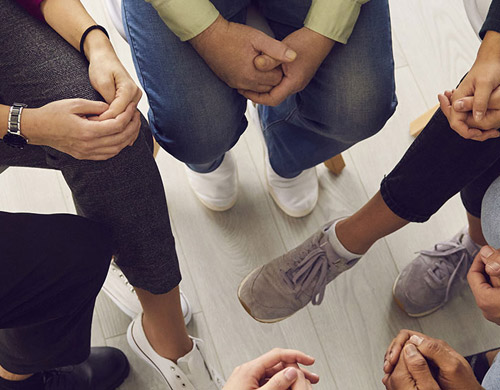Alcohol and drug dependencies introduce difficulties when you or a loved one experiences them. But addiction is a treatable disease and by using proven and professional treatment methods, long-term recovery can be embraced.
This page will explain integrated approaches to addiction rehabilitation and how you or someone you love can begin and maintain recovery from addiction.
What is Addiction Rehab (Rehabilitation)?
The term substance ‘rehab’ is applicable to all of the medical and psychological treatments used to help individuals who have dependencies on illegal substances including heroin, or prescribed medications such as opiates. There is no ‘one size fits all’ approach to addiction rehab because it needs to be unique to your requirements and may include detox, residential and outpatient care, and extended relapse prevention programs.

Facts & Statistics about Addiction in Escondido
Prevalence of Substance Use Disorder, by Drug Type
(IN THOUSANDS)
- 2,7578.5%Any Substance
- 2,0886.4%Alcohol
- 1,0683.3%Ilicit Drugs
- 2060.6%Pain Medication
Drug- and Alcohol-Induced Deaths by Age Group, California, 2016
- Alcohol-Induced
- Drug-Induced
- 18 to 250.5
- 9.6
- 26 to 354.3
- 13.9
- 36 to 6424.2
- 22.9
- 65+23.7
- 9.4
Drug Use, by Selected Type and Age Group California, 2015 to 2016
- 12 to 17
- 18 to 25
- 26+
- Marijuana*13.2%
- 34.0%
- 13.5%
- Misuse of Pain Medications3.5%
- 8.0%
- 4.3%
- Cocaine0.8%
- 7.2%
- 1.8%
- Heroin0%
- 0.4%
- 0.2%
What are the treatment options available in Escondido?
By integrating treatment models, addiction specialists can work with you to identify and treat the main causes of your drug dependencies. Through learning healthy coping mechanisms you can heal from substance abuse while treating the main symptoms of the disorder.

Private Residential Programs
Living at a addiction rehab center and obtaining all of your treatments there is what’s known as a residential rehab program. The main benefit is being able to receive integrated support and treatment throughout the day. By taking yourself away from your home and residing at the rehab facility you can safeguard yourself from the stressors that keep you trapped in the cycle of substance abuse.
When you stay in a safe and supportive environment you can safeguard yourself from relapse and increase the likelihood of finishing your addiction rehab program. Residential rehab programs are considered more effective if your substance dependency is chronic or severe, or if you struggle with co-occurring illnesses or a dual diagnosis. We understand that the early stages of recovery are pivotal and after a residential rehab program, you need to stay focused so that you can maintain your recovery. After you finish your residential treatment program your priority will be on transitioning to greater independence as you consider what you want from your new sober life.
Do You Need Help?
Our admissions team is ready to answer your questions.

Sober Living Programs
You can build the skills required to exercise control over your life by participating in a sober living program, which will support you through the transitional period. This is done by:
- A house manager who will visit you regularly
- Supporting you on the right way to behave in recovery
- Fostering important friendships with others in recovery who understand your experiences
Detox Only Programs
The early phase of a rehab program is detoxification, which eliminates all traces of substances from your system and deals with your dependency on it. You usually undergo withdrawal symptoms as a natural reaction to the absence of the substance in your body.
This marks the beginning of the rehabilitation journey, and the next steps are to identify and heal the underlying causes of your addiction, so that the pattern does not repeat. A number of drugs cause ongoing cravings and withdrawal symptoms after you have completed drug or alcohol detox. Your chances of relapse are reduced as you build on the skills required to cope with your new life.
Outpatient Programs
Outpatient addiction treatment programs are usaully quite flexible and allow you to have therapy at the rehab center while you continue important job or life commitments.
Outpatient programs are best known for:
- Education on drug use
- Counseling and therapeutic interventions such as individual or group sessions – Your individual needs often determine the duration of your outpatient program, which may extend from a couple of months to over year.
Paying for Private Treatment
Private treatment costs have to be settled yourself or claimed via your health insurance. Many health insurance providers cover some of the costs of rehab, which includes medical detox, the rehab treatment program, medicines you may need and aftercare and support. The amount of cover offered by your policy is down to your provider and the policy agreement.
It is good practice to inquire about your cover prior to enrolling in a rehab program. Check out our Verify Your Insurance page to learn about the cover you qualify for. If you choose not to claim against your insurance provider, you will need to fund your treatment. Many rehab facilities extend payment plans to clients who can then spread the cost over a period of time.
State Funded Programs
State-funded rehab programs can be used by those who struggle with alcohol addiction or substance addictions and who may not have the financial means to pay for private rehab. These programs make use of government funds from state budgets, Medicaid and federal government to provide addiction recovery by offering:
- Services for a safe detox (medically-managed if required.
- Addiction counseling, therapy and extended support services
State-funded treatment programs are available to individuals who do not have private health insurance or who reside in low income areas. During the application process you will need:
- Medical records that highlights your addiction issues
- Proof of where you live
- Proof of income
- Certification that shows you can live in the US legally
https://www.grants.gov/ provides all the info required to apply. To find the contact details for your state agency, this pdf provides the necessary details.

State-funded options in Escondido:
McAlister Institute for Trt and Educ North Inland Regional Recovery Ctr
200 East Washington Avenue, Suite 100, Escondido, CA 92025
760-741-7708
www.mcalisterinc.orgFellowship Center Alcohol and Other Drug Services
737 East Grand Avenue, Escondido, CA 92025
760-745-8478
www.thefellowshipcenter.orgMission Treatment Servs of Escondido
161 North Date Street, Escondido, CA 92025
760-658-9698
www.sandiegoctcs.com/location/escondido/
Maintaining Addiction Recovery in Escondido
The early stages of your recovery can feel challenging when returning to normal life after leaving the treatment center. When you were in rehab the environment was controlled and you had support from professionals. When you leave, you may encounter new challenges or triggers that test your coping skills in ways you may not have anticipated. Long term sobriety is more difficult to maintain when you have had a severe dependency and do not have social support when you leave rehab. Guidance and aftercare support is integral in the early stages of recovery to help prevent relapse.
The following AA/NA meetings are available in Escondido:
FELLOWSHIP CENTER
Close for Comfort Group Topic, Basic Text and Closed:
736 East 2nd Avenue, Escondido, CA 92025
Saturday: 6:00 pm
https://www.drugstrategies.org/HOUSE OF PRAYER LUTHERAN CHURCH
Escondido Sunday Group, Discussion/Participation and Closed:
795 North Rose Street, Escondido, CA 92027
Sunday: 6:30 pm
https://www.drugstrategies.org/AA - Acceptance and Recovery
Virtual Meeting:
1800 North Broadway, Escondido, CA, 92025
Sunday: 7:00 pm – 8:00 pm
https://alcoholicsanonymous.com/
Aftercare & Alumni Programs
By participating in an aftercare program you get extended rehab support when you go home. Up to 60% of clients in recovery will relapse because of the unpredictable life challenges, so enrolling in aftercare programs can boost your chance of long-term recovery success.
When you get closer to completing your treatment program, you must think about which services will be beneficial for your long term recovery. We help you to create an aftercare package that supports you. After you have completed your addiction treatment program you will be eligible to join an alumni community program so you can remain close to staff and peers. You will benefit from access to mentorship and guidance from other individuals in recovery, as well as attend other Alumni events. We encourage you to consider supporting other former clients who are active in your network if you choose to.
Support Groups (Fellowship Meetings)
Support groups are an integral function of long-term recovery because social responsibilities enable long-lasting sobriety.

A couple of the oldest and most used support groups are Alcoholics Anonymous and Narcotics Anonymous, which make use of the 12-step model to support people in recovery via group meetings. When you attend nearby support group meetings you will hear, and understand, the recovery stories of other members. Many individuals in recovery attend local meetings to assist them in the early and later stages of addiction recovery. Support groups provide them with vital tools to stay sober, allowing them to take responsibility for their own journey in recovery.
Support for Families & Children Affected by Addiction
Addiction negatively impacts those living in the household to some extent. It’s not only the person with the addiction who is hurt, the other people in the family need support too. By joining family support groups, you will learn to manage stressful situations more efficiently, and be able to support your family member in recovery.
Family members can benefit from joining support groups such as:
- Parents of Addicted Loved Ones
- SMART Recovery Family & Friends
- NAMI Family Support Groups
- Al-Anon
- Families Anonymous
- Alateen
- Nar-Anon










